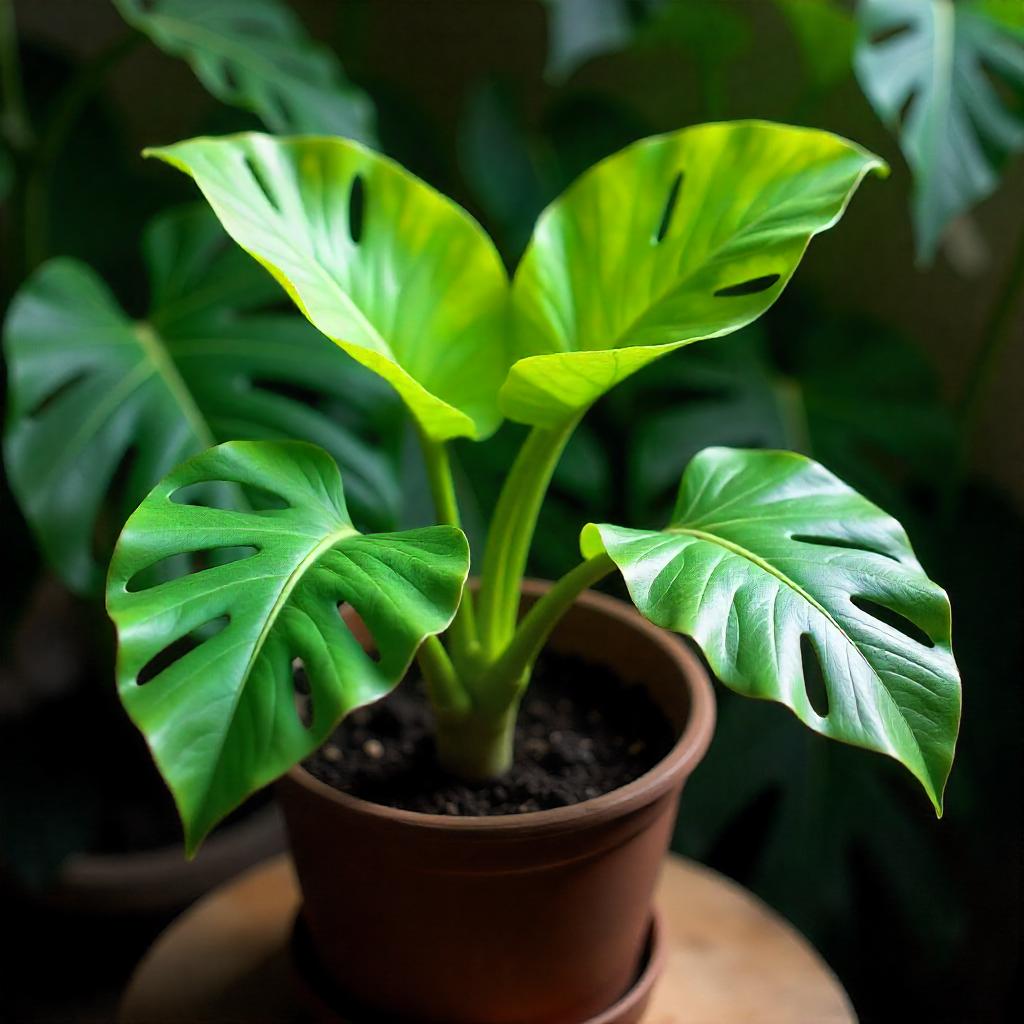Choosing the right type of soil for your Monstera plants is very important for their health and development. A healthy Monstera originates at its base with the dirt it is planted within. Being in a position to recognize the importance of this first step gives reason to a well-succeeded plant.
The best soil to grow Monstera plants is a balancing act that requires a delicate understanding of several types of soil mixes available in the market, their draining abilities, and how to make specific DIY mixes to suit various requirements of these beautiful and popular houseplants.
Importance of Choosing the Right Soil Mix
The ideal mix of soil forms the basis of growth for the Monsteras, as it will be the supportive medium to nourish plants for the most healthy build-up. A proper mixing of soil safeguards the plant against some waterlogging and prevents root decay, while at the same time encouraging good roots. An unsuitable blend of soil may weaken the plants and perhaps make them more susceptible to diseases and deficiencies.
Undesirable soil composition for the plant reduces its ability to absorb the nutrients as needed and hence spends extra time on growth and development. Proper aeration allows for oxygen to reach the roots, thus enabling the plant to absorb nutrition, while proper drainage avoids water clogging, which could cause a lack of oxygen in the root zone and hence affect plant growth negatively. The appropriate kind of soil mix provides optimum conditions for the elementary functions of the Monstera plant-growing leaves and developing broadly.
Investing in high-quality soil ensures not only the health of a plant but also reduces transplant shock, together with other stress-related issues. The proper mix of soil that addresses the particular needs of the Monstera will encourage healthy root development, strengthening the plant to better resist environmental stressors. It also enables the plant to undergo a number of stages of development with ease, ensuring it grows successfully with maximum performance. By appreciating the value of choosing an appropriate mix of soil, the lover of the plant can help the plant get a good chance to grow well and to last for a long time.

Characteristics of Ideal Monstera Plant Soil
Soil used on Monstera plants should be that which has good drainage for the prevention of waterlogging, allowing the roots to have aeration hence reducing the probabilities of root rot. It should be light and airy in texture to provide the correct amount of moisture to be retained while offering aeration during plant growth. Such a type of soil will allow the roots to access oxygen efficiently, which is important for use in the general health of the plant.
Adding to this good drainage, the best type of soil for a Monstera plant should have a pH ranging from 5.5 to 7.0, hence slightly acid to neutral, which will favorably promote nutrient uptake in the plant. Soil within this pH range will efficiently enable the plant to take up minerals and sustain a healthy rate of growth and development. It will be necessary to check the pH frequently and change it when necessary in order to maintain it within this range.
In addition, the growing mixture for Monstera plants should contain organic matter, such as peat moss, compost, or well-rotted manure. Such organic matter will provide constant nourishment for the plant in a healthy development of foliage and robust growth. Organic matter helps to improve soil structure, water retention, and availability of nutrients while enhancing the general health and vigor of a growing Monstera plant. Organic matter in the soil mix will provide a fertile growth medium to help with the plant’s needs.
In other words, the best soil characteristics for Monstera plants are good drainage, aeration, proper pH, and organic content. You can help your Monstera grow with all of these elements in the soil mix: a nurturing environment that helps to develop healthy roots, increase nutrient absorption, and simply build a very vital plant.
Best Commercial Soil Options for Growing Monstera Plants
When it comes time to find the best commercial options for Monstera plants, invest in high-quality mixes that will provide an ideal nutrient and drainage combination. The Miracle-Gro Potting Mix and Espoma Organic Potting Mix are some of the great choices for any plant enthusiast, with quality ingredients and great aeration properties. These mixes allow for healthy root development and moisture retention to take place in your Monsteras.
If you lean toward organic options, here are some of the best soil blends: Foxfarm Ocean Forest Potting Soil or Black Gold All Organic Potting Mix. These products contain a high amount of organic matter that feeds your Monstera in a very natural and environmentally friendly way. Organic soil blends enhance soil structure and microbial activity, creating an environment in which your plant can thrive.
Whether using a premium potting mix or an organic soil blend, the bottom line is to go for quality in the soil that shows the health and vitality of the Monstera plant. Use a high-quality, store-bought commercial soil with the right nutrients and moisture proportionate to the needs of the plant, promoting a healthy foliage system and a robust rooting system. Therefore, the appropriate soil mix you choose would mean a healthy and beautiful Monstera plant to give grace to your interior.
Premium Potting Mixes for Monstera
Specialized premium potting mixes for the Monstera plant are highly peculiar in meeting the needs of these beautiful tropical organisms. They usually consist of a blend of peat moss, perlite, and pine bark for the best aeration, moisture retention, and nutrients. These are their special features, which definitely will enhance the healthy growth of roots and the plant in its entirety; therefore, they are an important choice for any enthusiast who desires to give the best care to his plant.
When selecting the highest quality potting mix for your Monstera, opt for those that have been labeled as specifically tropical or for indoor houseplants. Such mixes may include additional materials to condition them, like coconut coir and orchid bark, to put your plant in just about the right environment for growth and development. Usually, premium potting mixes come without chemicals and other pathogens, which makes them a healthy base for growing your Monstera safely.
These include Espoma Organic Potting Mix, FoxFarm Ocean Forest Potting Soil, and Miracle-Gro Indoor Potting Mix. In fact, they have been highlighted as some of the best regarding performance and quality; hence, they will be able to provide your Monstera with all the necessary nutrients and conditions for survival. You will find a big difference in the health and longevity of your plant if you invest in a premium potting mix. You will notice a big difference in the health and longevity of your plant. Your Monstera plant will flourish and continue beautifying space with its presence for years.
Organic Soil Blends for Healthier Plants
The organic soil mixes play an important role in bringing health and vitality to the Monstera plants. They have a great amount of natural nourishment with useful microorganisms that ensure the most active growth and healthy development of your green friends. By integrating organic soil mix into the environment of your Monstera, you will be able to work on root development, absorption of nutrients, and strengthening the plant against pests and diseases.
Chemicals and pesticides should be completely absent while choosing organic soil mixes for monsteras. Look for organic materials like compost, peat moss, coconut coir, and perlite combined into a growing mix that is well-balanced and highly rich in nutrients. It is these organic elements that supply the necessary nutrients, excellent aeration, and proper retention of moisture-all basic needs that help one create healthier and more flourishing Monstera plants.
You will want to add extra compost or organic matter to your organic soil mixtures for better soil fertility and microbial activity. This will be a much more viable and environmentally friendly way of raising your Monstera in conditions much like that of its natural habitat and have it grow for years to come. Once you incorporate organic soil mixes into your care routine, you will have a favorable and prosperous environment as your Monstera grows to its fullest potential.
DIY Soil Recipes for Monstera Plants
For the Monstera plant, start a DIY recipe with a well-draining potting mix as the base. Combine equal parts peat moss to retain moisture with perlite to add aerations. Add in some organic matter such as compost to enhance the soil’s fertility and texture. This mixture offers a balanced medium for good root development.
Creating a Balanced Potting Mix
A balanced potting mix is important for the health and growth of a Monstera plant. In making the potting mix, peat moss, perlite, and pine bark can be used in equal portions to provide good aeration, retention of moisture, and drainage. Mixing these will more or less approximate the natural environment in the tropics where Monsteras come from, enabling their roots to develop healthily and give vigor to the plant.
Peat moss is used as a base in potting mixes for the Monstera plant because it provides the necessary organic matter in the potting mix that retains moisture but does not compact the soil. Perlite is a type of volcanic glass that helps with drainage and aeration by preventing soil compaction. Pine bark helps add structure to the mix for root growth and helps to enhance nutrient uptake for robust plant growth.
The balance of these components in your potting mix will ensure the soil is well-draining yet can retain adequate moisture for the plant. Adding some slow-release fertilizer into this mix will provide the necessary nutrition over a period of time, and the plant gets just enough to keep it healthy and vigorous for a long period. You can experiment with ratios to come up with a blend that works best for your Monstera regarding the specific growing environment.
Homemade Organic Compost Additions
Homemade organic compost inclusions are the best way to improve the nutritional value and health of your monsteras. With the addition of natural compost into the soil mix, one will be capable of providing a concentrated source of necessary minerals that carry beneficial microorganisms for heavy growth, showing vibrancy in foliage. Following are some key additions:
- Composting Kitchen Scraps: Compost fruit and vegetable scraps, coffee grounds, and eggshells to feed your Monstera with nutrient-rich soil. With time, these organic materials will decompose and release value nutrients into the soil.
- Leaf Mulch: Collect fallen leaves from your garden or other nearby parks to create a nutrient-rich leaf mulch layer for your plant. The leaf mulch will enhance the structure of the soil and retain moisture while releasing nutrients at a slow pace throughout its decomposition process.
- Compost Manure: Manure compost derived from herbivorous mammals and aged properly can be a very good organic stimulant for the plants belonging to the Monstera genus. This serves as a fertilizer, enhances microbial activity in the soil, and helps in the absorption of nutrients.
These homemade organic compost inclusions will also go a great deal in ensuring one’s Monstera plant care is rewarding, as it will contribute to the health and vibrancy of these houseplants. You can experiment with different compost mixtures to find an optimum blend for your Monstera.

Testing Drainage in Soil to be Used for Monsteras
Soil drainage is another concern when one is trying to avail to Monstera with the most ideal conditions possible. This is because proper soil drainage prevents waterlogged conditions that may cause root rot in your plants. Testing the drainage in the soil can be done in the following ways:
Percolation Test: Dig a hole into the soil in which you plan to pot your Monstera. Fill with water and let it completely drain. Refill with water; time how long it will take to drain. Ideal drainage allows the water to percolate through in a few hours.
Squeeze Test: Take a fistful of wet mix from your prospective potting soil and squeeze. If water spurts out, the soil mix is too wet. The well-draining mixes hold water but do not become spongy.
Visual Test: Observe your soil mix after its watering phase. If water either congregates on the surface or drains into the container very slowly, then the soil is not draining adequatrectify this problem by adding perlite, bark, or sand to improve drainage.
Regularly testing and enhancing soil drainage for your Monstera plants is essential for their overall health and vitality. Properly draining soil ensures oxygen reaches the roots, prevents water-related issues, and fosters a healthy root system, promoting flourishing plant growth.
Adjusting Soil pH for Monstera Care
Soil pH is a very critical aspect of plant care, as it influences nutrient availability and further affects the health of the plant. Monstera grows well in slightly acidic to neutral soil; the pH range should be from 5.5 to 7.5. For best growth, always observe the pH level of the soil and make frequent adjustments to sustain an optimum environment for your Monstera plant.
Changing the pH level of the soil is quite easily done with any pH testing kit, which is available in any gardening store. When it is too low, which means it is more acidic, you increase it by adding lime to the soil. On the other side of the coin, in case the pH level in your soil happens to be too high, which would mean its on the alkaline side, then you will need to decrease it with sulfur or acidic fertilizers. Such testing and adjustments should be done quite regularly in order to arrive at the required range of pH for your Monstera plant.
For that matter, keep in mind that sudden and extreme changes in pH can tend to stress the plant. It is best to gradually make such a change over time. Also, be sure to follow up closely on how the change in pH will affect your plant, negatively or positively. By keeping the soil at the right pH, you should be able to stimulate a good rate of growth, bright green leaves, and overall health for your Monstera plant.
Soil Health for Long-Term Monstera Plant
The key to keeping your Monstera healthy lies in soil health. Periodic monitoring and care are very important for maintaining the best conditions in the soil. Avoid overwatering the plant, for it can finally affect root decay and nutrient loss. Proper drainage will avoid waterlogging, ensuring aeration and health of the roots.
Periodically check the soil for compaction. The plant needs aeration for root respiration and nutrient uptake. Aeration, when needed, is done by using aeration spikes or lightly loosening the top layer. This aids in soil structure and root development, hence improving the health and life of the plant.
The frequent testing of soil can give an idea about the nutrient levels and pH balance. The soil pH can thus be altered based on the plant’s demand on the soil pH. The optimum pH, ranging from 6.0 to 7.0, provides maximum nutrient availability. Nutrient-rich soil encourages healthy growth, foliage development, and gives vigor to the plant in general, leading to a long life span with vitality.
Lastly, it is also very important to select proper soil for your Monstera plants. Commercial or homemade preparations may be used, but the real priority should be on providing well-draining soils that allow an indoor jungle to finally flourish. Be very careful with the soil for longevity and health in your prized Monstera.
